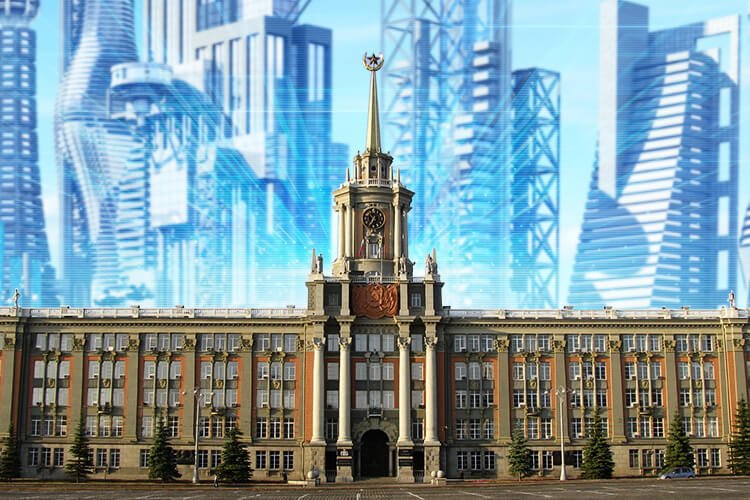Over $3 billion for a coffee maker, washing machine and refrigerator

In May 2017 Yekaterinburg submitted to the Bureau of International Expositions (BIE) its candidature to host World Expo 2025. By the end of last year, the number of costs in case of Russia's victory was announced, which at that time ranged from 1,6 to 2,3 billion dollars. However, a few days ago, the head of the Ministry of Industry and Trade Denis Manturov announced a new amount of expenses – more than $3 billion. What can such money be spent for?
The theme of the Russian bid is “Changing the World: Innovations and Better Life for Future Generations”. Its idea is to create a whole district in the territory of Yekaterinburg, organized according to the concept of the smart city. The place for the World Exhibition is located three kilometers from the center of Ekaterinburg, next to the border that separates Europe and Asia. Its area is about 5 km². There will be located 103 pavilions. The leader of the promotion of the Russian application Expo 2025 Ivan Burtnik explains this choice as follows:
Our project in the city on the border between Europe and Asia is the answer to the challenge of international competition between the largest cities and capitals, such as London, San Francisco, Hong Kong. I knowingly pointed out the place: this is a very convenient location. It’s easy to get here both from Asia and Europe. This place can become a binder in the environment of high technologies. Koltsovo Airport is the best regional international hub. In addition, Yekaterinburg has a powerful energy potential – Beloyarsk NPP, and there will be enough energy for our project, which is important.
It is planned that the number of exhibition visitors will be 14 million people. For comparison: the population of Yekaterinburg itself is 1.5 million people. According to Ivan Burtnik, the uniqueness of the project lies in the fact that after the Expo 2025 the smart city will become the current district of Yekaterinburg, where up to 50 thousand people will live. There are 555 hectares allocated for the smart city.
Internet of Things
The key technology that underlies the smart city is the Internet of Things. Simply speaking, IoT is a network that can unite absolutely all technical devices around us: from a coffee machine to a car. Simply speaking, IoT is a network that can unite absolutely all devices around us: from a coffee machine to a car. That is, while at work, a person can use his smartphone, where a special application is set, to see what products are in the refrigerator (most smart refrigerators are equipped with a web camera) or to give the coffee machine command to prepare cappuccino by the time of arrival. Obviously, the price of gadgets with this function will be much higher than the market price. For example, the cost of Samsung "smart" refrigerator from can reach 200 thousand rubles. In Yekaterinburg, as part of the project, such refrigerators will have to provide each apartment.
Blockchain
Blockchain is another integral technology of the smart city. The president of the Russian association of cryptocurrency and blockchain Yuri Pripachkin gave Bitnewstoday.ru an exclusive interview about the role and opportunities of blockchain:
All types of services are possible with the use of blockchain technology. This is something that we all have to see in the near future. For example, it is an opportunity to build a system of consumption of public services on the basis of smart contracts. This is when all the sensor and meter data - light, water, gas, heat - are automatically connected to a single system. Information about actually consumed resources will be read, and money for utilities will be automatically withdrawn from the bank account of the citizen.
Blockchain can be used in such industries as healthcare, trade, energy, transport, etc. The introduction of blockchain technology into the life of a modern city is a difficult process that requires a lot of money, time and effort. However, if successful, the innovation will save a huge amount of finance and working hours (for example, by optimizing the processing of documents), and achieve coherence in the work of enterprises and government institutions.
Big datа
The Expo 2025 organisers said that big date technology would be implemented during the exhibition. It is quite simple: various devices (security cameras, GPS trackers, historical data, social media posts and other) serve to store huge amounts of data which are used to make quality of suggestions better. For instance, GPS trackers data analysing makes it possible to find out the busiest routes and offer a smart city driver an alternative taking into account the time he can spend on the trip. And this is not the whole spectrum of technologies which will impress the International exhibition quests. Talking about the exhibition visiting conditions, the head of Ministry of industry and trade in Russia Denis Manurov emphasized: “In addition to the sources of finance and balanced budget we will offer Expo 2025 visitors and guests the cheapest entree prices for air flights, railway transport and accommodation. Moreover, the purchasing power parity in Russia enables to get much more goods for one euro than in other developed economies. It provides more profitable conditions for staying in our country.”
Many experts believe that the Russian project will succeed and in 2025 Ekaterinburg will host all the perfect minds of the world, showing the maximum of technological potential. The Russian smart city concurrence are the Human Capital project from Baku and the application of Japanese Osaka based on the theme Designing Future Society for Our Lives. France also submitted an application. However, the country changed its mind in January 2018.
The venue will be announced 23 November 2018 on BIE general assembly while we should just wish the Ural capital good luck and hope that smart city concept in Ekaterinburg will be implemented until the 1 May 2025, as it is planned.